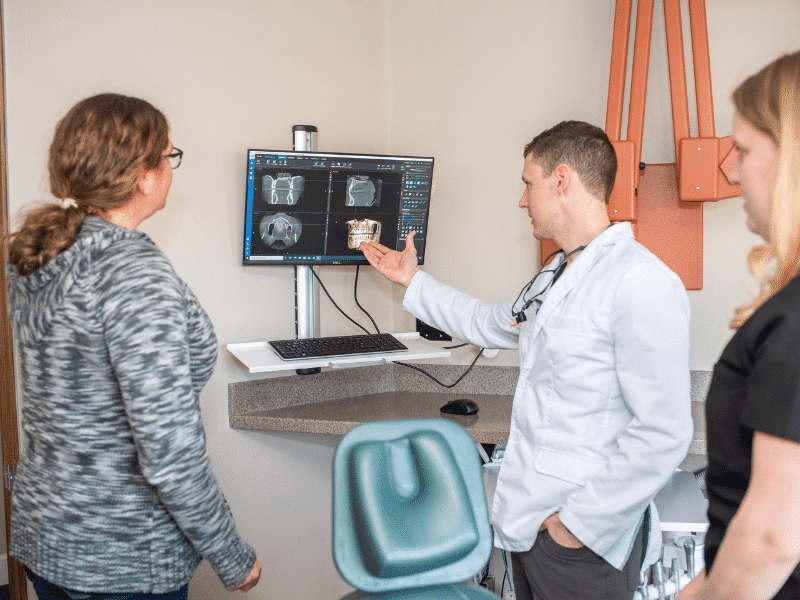Understanding Root Canals

How Root Canal Treatment Can Save Your Tooth

A root canal is a common and effective procedure to save a damaged or infected tooth. If you’re experiencing pain or discomfort in a tooth, it could be a sign that you need a root canal. At High Desert Dental, as the best dentist in Grand Junction, CO, we are committed to providing our patients with the information and care they need to understand root canals and their benefits in preserving natural teeth.
What Is a Root Canal?
A root canal is a dental procedure that involves removing the infected or damaged tissue inside the tooth. The dentist cleans, seals, and restores the tooth to prevent further issues. The tissue inside the tooth, known as the pulp, contains nerves, blood vessels, and connective tissue. Infected or damaged pulp from cavities, cracks, or trauma can cause pain, requiring a root canal.
The procedure is simple and usually takes one or two visits. With modern techniques and anesthetics, most patients experience little to no discomfort during the procedure.
Why Would You Need a Root Canal?
Several situations can lead to the need for a root canal. Some common reasons include:
- Deep Cavities: If you leave a cavity untreated, it can infect or inflame the tooth pulp.
- Trauma or Injury: A tooth injury from an accident or sports can damage the pulp and cause infection.
- Severe Tooth Sensitivity: Sharp pain from hot or cold foods may indicate pulp damage needing a root canal.
- Abscessed Tooth: An abscess occurs when bacteria infect the pulp, leading to a pocket of pus and severe pain. If left untreated, an abscess can cause tooth loss.
The Root Canal Procedure
A skilled dentist performs the root canal procedure, usually under local anesthesia for comfort. Here’s a general outline of what you can expect during the procedure:
Consultation and Diagnosis: Your dentist will first take X-rays to evaluate the extent of the damage and infection. This helps the dentist determine if a root canal is necessary and which tooth structures need treatment.
Anesthesia: To numb the area and minimize discomfort, your dentist will administer a local anesthetic. You’ll remain awake and alert during the procedure but should feel no pain.
Accessing the Pulp: After numbing, your dentist will create a small opening in the tooth to reach the infected pulp.
Cleaning and Shaping: Your dentist will remove the infected pulp and clean the tooth to eliminate bacteria and debris.
Sealing the Tooth: After the dentist cleans the tooth thoroughly, they seal it with a rubber-like material called gutta-percha. This prevents future infection and seals the tooth.
Restoration: In most cases, after a root canal, the tooth will need a crown to restore its strength and function. The crown will protect the tooth from further damage and allow you to bite and chew normally again.
Signs You May Need a Root Canal
There are several signs and symptoms that may indicate the need for a root canal. Common signs include:
- Persistent Tooth Pain: A deep, throbbing pain in the tooth is a common sign you may need a root canal.
- Swelling and Tenderness: Swelling in the gums near the affected tooth or tenderness when touched could indicate infection.
- Tooth Sensitivity: Prolonged sensitivity to hot or cold foods and drinks may indicate that the pulp is damaged or infected.
- Discoloration of the Tooth: A dark or discolored tooth may signal pulp damage, requiring a root canal.
- Abscess or Pimple on the Gums: A pimple-like bump on your gums near the tooth may indicate an abscess, needing a root canal.
The Benefits of Root Canals
A root canal offers several benefits, making it an effective and necessary procedure for saving damaged teeth. Some of the key advantages include:
Saves Your Tooth: The primary benefit of a root canal is that it allows you to keep your natural tooth. Without a root canal, the tooth may need extraction, leading to costly replacements like implants or bridges.
Pain Relief: Dentists often perform root canals to alleviate severe tooth pain caused by infection or damage to the pulp. Once the dentist removes the pulp and seals the tooth, the pain typically disappears, and the tooth becomes comfortable again.
Prevents Further Damage: A root canal prevents the infection from spreading to nearby teeth, gums, and bone, reducing further damage.
Restores Function: After sealing and crowning, the tooth will function like a natural tooth, enabling easy chewing and speaking.
Aftercare and Recovery
Recovery after a root canal is usually quick and uncomplicated. You may experience mild discomfort for a few days, but you can typically manage it with over-the-counter pain relievers. Follow your dentist’s post-care instructions, such as avoiding chewing on the treated tooth until it is fully restored.
Contact Us
Root canals save a tooth from extraction and restore its full function. If you have tooth pain or sensitivity, see your dentist promptly to check if a root canal is needed. At High Desert Dental, the best dentist in Grand Junction, CO, we ensure a comfortable and effective root canal experience.
If you think you may need a root canal, don’t wait until the pain gets worse—schedule an appointment with High Desert Dental today. We’re here to help you restore your smile and maintain optimal oral health.






